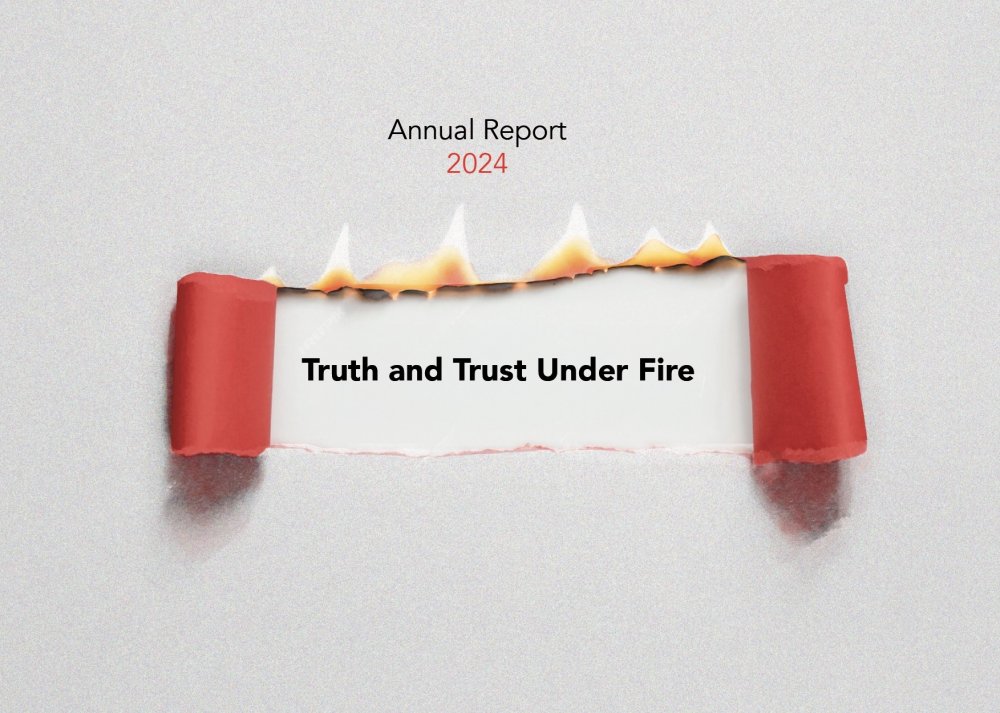
Truth and Trust Under Fire
Imagine if someone switched off every form of news media available today. Everything gone. How would our world look then? What would we know about our surroundings, or about anything at all? How limited, narrow-minded, and inevitably unjust would our societies become? Now imagine this same individual, according to criteria guided solely by their own interests, selected a handful of media outlets to bring back online. Chances are, these chosen outlets would be ones they already owned or controlled. How misguided, delusional, and ultimately dystopian would we then become?
This bleak scenario might well become reality if the fate of journalism depended exclusively on political interests or uncertain, conditional funding. The recent decision by the US administration to freeze or suspend foreign aid, including support to media organizations, is a stark wake-up call. Not because funding for media should necessarily take precedence over other critical humanitarian needs, but because journalism, the very lens through which we interpret global events and political decisions, must not be at the mercy of political whims. It is also a clear indicator that our collective efforts to nurture resilient, independent, and professional media institutions have so far fallen short. These media outlets urgently need robust and sustainable mechanisms that protect them from sudden political and financial disruptions.
Yet, the challenges journalism faces today extend far beyond funding. The year 2024 presented irrefutable evidence of a systematic assault against journalists and truth-seekers. More than 120 journalists lost their lives in Gaza alone, and intentional targeting of media workers occurred repeatedly in Lebanon. Freedom of expression is at stake, too. The lines between right and wrong have hardened into absolutes, forcing politics and culture – and by extension, journalism – into stark, uncompromising binaries. The space for nuance, interpretation, and analysis is shrinking dramatically, replaced by narratives of dominance and hegemony. History reminds us vividly where this path leads: toward dreadful times indeed.
Amid these alarming developments, the dramatic collapse of the Assad regime in Syria stands out as a critical juncture. This historic event not only marks the end of decades of oppression but also presents a fragile window of opportunity for the rebirth of free expression and independent journalism in Syria. Yet, it also raises fundamental questions: Can Syrian media rebuild effectively after years of systematic repression, violence, and propaganda? And crucially, will Syria’s evolving media landscape help reconcile a fractured society, or will it further inflame divisions?
From one annual report to the next, our future appears increasingly uncertain. Why is that? What have we missed? Why is the moderate, progressive agenda losing ground, leaving behind a vacuum filled only by extremist and fundamentalist discourse? These questions transcend the media community alone. But we must nevertheless be the first to pose them openly and encourage other stakeholders to participate in these critical conversations.
Yet another complexity arises from the recent global shift in information ecosystems. The unprecedented proliferation and sophisticated weaponization of social media have led us to a troubling crossroads. Should we pursue regulation, risking surrender of freedoms earned through generations of struggle and sacrifice? Should we retreat, allowing our hard-won liberties to become casualties of an unchecked digital battleground? Or should we mobilize all available resources, intellect, and capabilities to develop a balanced system that ensures the full protection and respect of freedoms while simultaneously safeguarding society against the weaponization of information technology?
Over the past years, the Samir Kassir Foundation (SKF) has marshaled considerable resources to help emerging media organizations develop sustainable business models – a crucial step toward addressing at least one of these pressing questions. The Foundation has doubled its investments in journalist protection, from safe hosting to physical safety and psychological support. We continue to seek innovative solutions to strengthen the productivity and revenue streams of journalists and media organizations. Our ongoing commitment includes reinforcing our disinformation-combatting frameworks, and expanding these capabilities to our media partners. Furthermore, we have actively engaged in nearly every global debate concerning the present and future of journalism, as both a profession and a vital public mission.
Ultimately, responding to today’s formidable challenges demands a holistic, coordinated approach. We believe this is achievable through strengthened global collaboration – one that brings together the capacities and resources of independent media organizations, human rights defenders, academia, socially responsible business leaders, and political allies worldwide.